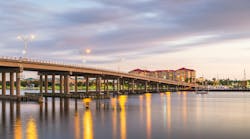The U.S. Environmental Protection Agency (EPA) is considering a proposal from the state of Massachusetts to designate the coastal waters of Pleasant Bay/Chatham Harbor as a “No Discharge Area.” If approved, discharges of treated and untreated boat sewage would be prohibited within the town boundaries.
The Massachusetts Coastal Zone Management (CZM) and the Pleasant Bay Resource Management Alliance has petitioned EPA to approve the designation. EPA has in turn published the request in the Federal Register and will accept public comments on the proposal for 30 days, ending on June 7, 2010.
“Pleasant Bay/Chatham Harbor is a classic Cape Cod destination,” said Curt Spalding, regional administrator of EPA’s New England office. “Cape residents are taking an important step to protect and improve their coastal water quality, which means they're also protecting a vital economic resource.”
"Congratulations to CZM and its partners in Pleasant Bay and Chatham Harbor for doing their part to reach Governor Patrick's goal of designating all Massachusetts coastal waters as no discharge areas," said Massachusetts Energy and Environmental Secretary Ian Bowles.
Before EPA will endorse a “No Discharge Area” designation for any area, the applicant must demonstrate that there are enough “pumpout” facilities where boaters can get their sewage holding tanks pumped out. This particular area has an estimated 2,160 boats, of which 124 may have a "head" or toilet on board.
There are three marinas, several yacht clubs and public boating facilities in the area. There are a total of three pumpouts facilities in the proposed area.
“The ‘No Discharge Area’ designation is a longstanding objective of the resource management program for Pleasant Bay and Chatham Harbor,” said Carole Ridley, coordinator at the Pleasant Bay Alliance. “The surrounding communities are aware of the need to take all measures to control pollutants that threaten the health of coastal resources. This designation is an important part of our regional efforts to protect the Bay's exquisite natural resources, and to ensure a safe and enjoyable venue for boating, shellfishing and other cherished activities.”
The proposed area is roughly 9,000 acres and is an Area of Critical Environment Concern. The islands of Pochet, Sampson, Hog and Little Sipson Islands are held in trust; Strong Island is owned by the town of Chatham and the Chatham Conservation Foundation; Tern Island is owned by the Massachusetts Audubon Society. The Nauset Barrier Beach is within the boundaries of the Cape Cod National Seashore. The Bay is home to 36 finfish species and an abundance of quahogs, softshell clams, razor clams and scallops. This area is a popular destination for boaters due to its natural environmental diversity.
Source: U.S. EPA


